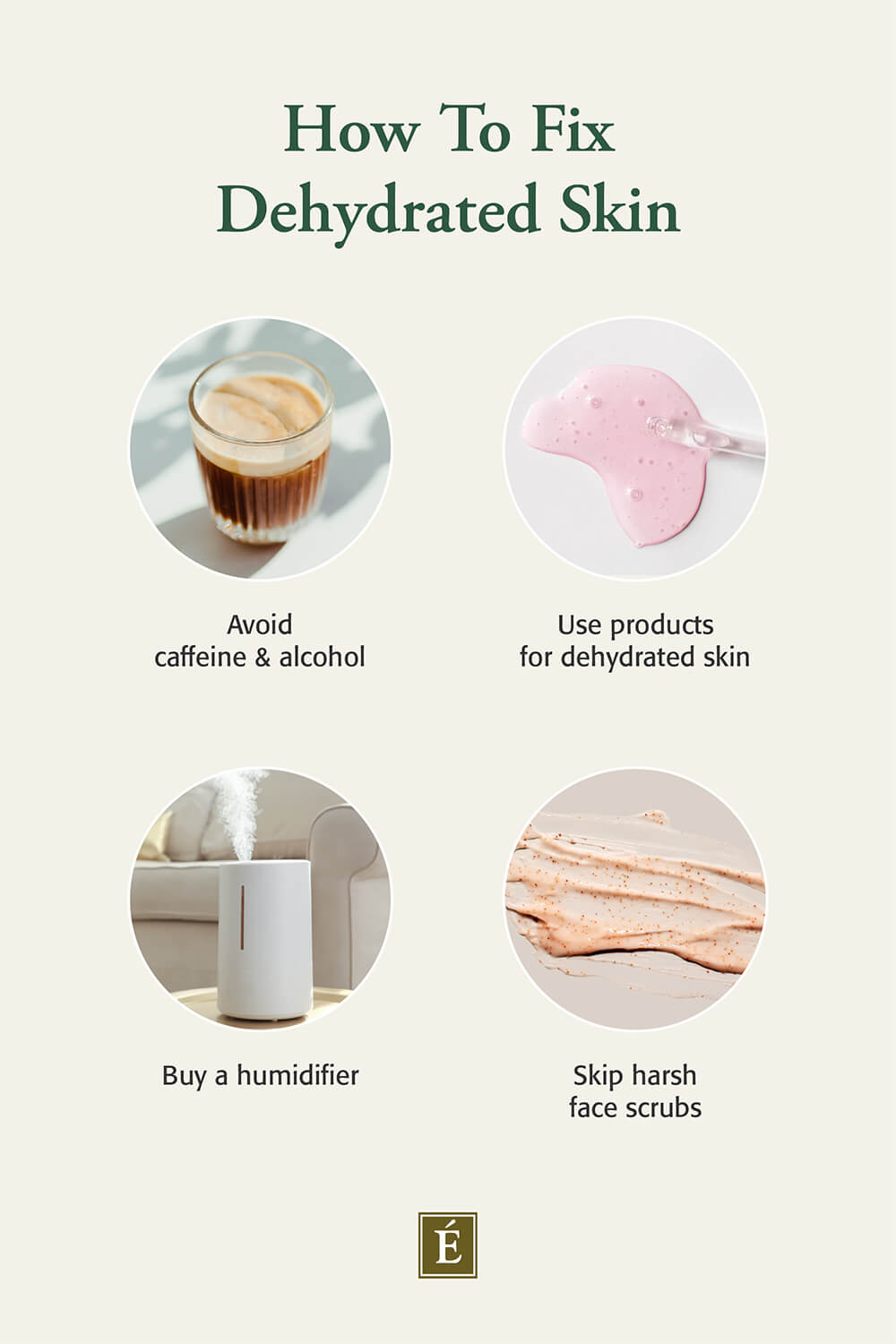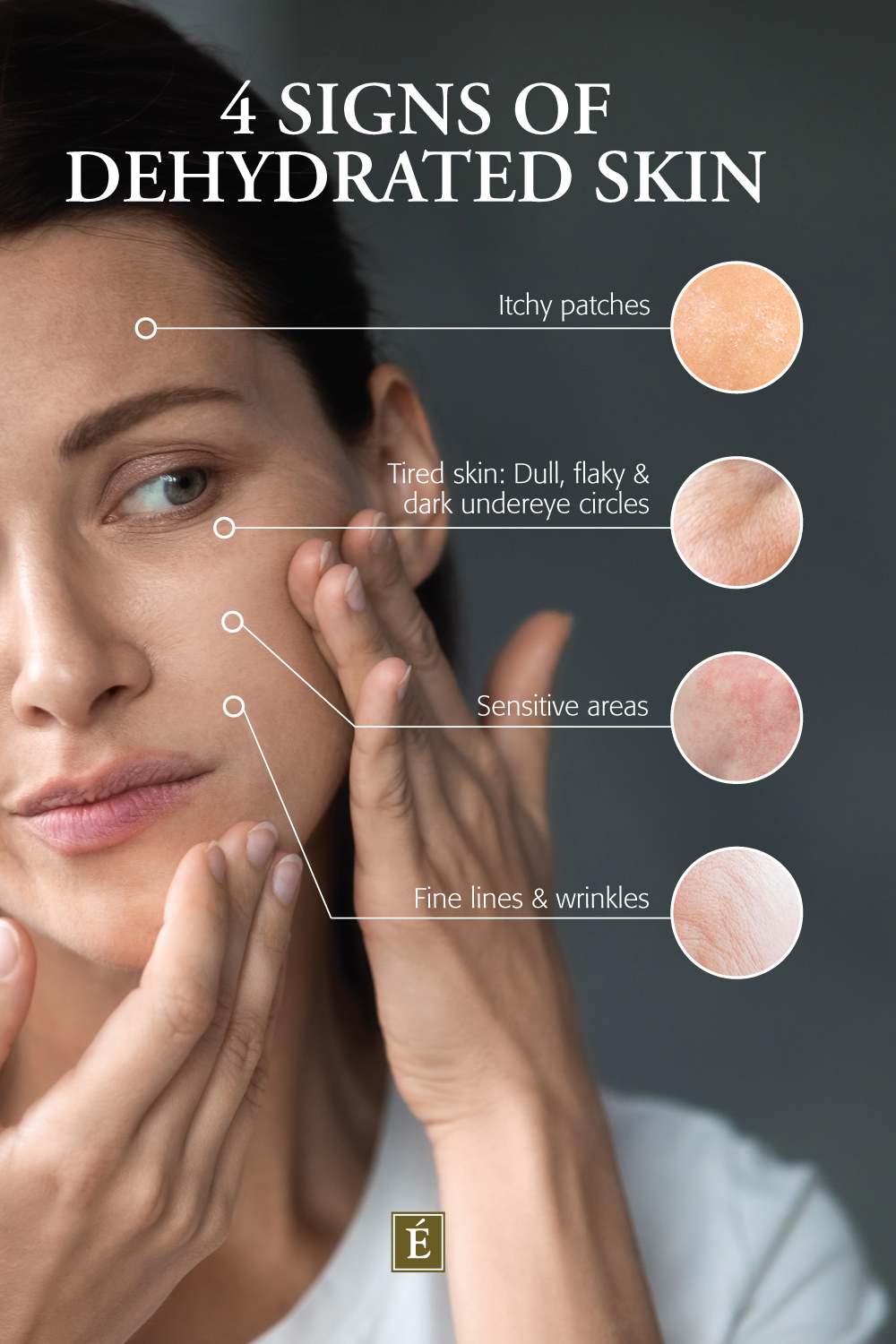
Does your skin feel more flaky and sensitive than usual? Has your natural radiance been zapped from your complexion? If this sounds like the state of your skin, it may be dehydrated. Here are the key signs of dehydrated skin and our recommendations for how to fix it.
What Is The Difference Between Dry & Dehydrated Skin? | 4 Signs Of Dehydrated Skin | How To Fix Dehydrated Skin | A Mini Three-Step Routine For Dry Skin
What Is The Difference Between Dry & Dehydrated Skin?
Dry and dehydrated skin share many of the same signs and symptoms, but they are actually quite distinct. Here is a quick breakdown of how these two skin care problems differ:
Dry Skin
Dry skin is classified as a skin type and is inherited through your genetics. Skin Inc defines a dry skin type as one that is predisposed to inadequate production of the skin’s natural oils. In addition, dry skin can be connected to hormonal imbalances or an underactive thyroid. This can inhibit your skin’s sebum production, contributing to a complexion that is dry and lackluster in appearance. While your dry skin type can’t be changed due to genetics, you can improve its appearance by adding oil-infused products to your skin care routine.
Dehydrated Skin
Dehydrated skin, on the other hand, is a skin condition. It is caused by external elements (weather and seasonal changes), unhealthy diet (lack of fresh produce) and lifestyle choices (alcohol or caffeine consumption). All of these factors deplete your skin’s water content, resulting in a less supple appearance. A key takeaway is that dehydration is characterized by a lack of water — not oil. Even oily skin types can become dehydrated. Luckily, dehydrated skin is temporary and can be relieved with a combination of topical treatments and lifestyle changes.
4 Signs Of Dehydrated Skin
Not sure if you’re struggling with dryness or dehydration? Here are four telltale signs that you have dehydrated skin:
1. Itchy Skin
Have you ever returned from a ski vacation or a day at the beach and felt an unrelenting need to scratch? External elements like wind and extreme temperature changes can zap moisture from the outer layer of your skin, causing a tight, itchy sensation. This is often accompanied by flaking, regardless of the amount of oil on your skin’s surface.
2. Increased Sensitivity
One of the biggest consequences of dehydrated skin is an increase in sensitivity. When your skin’s moisture barrier is disrupted, it cannot properly protect itself from external environmental stressors. As a result, irritants like bacteria and pollution can penetrate its outermost layer, worsening symptoms like redness, itchiness and irritation.
3. Dull Skin
Does your skin have an overall dull and tired appearance? Dehydration affects your skin’s ability to perform essential functions like cell turnover. Without adequate hydration, your skin does not shed its most outer layer frequently enough, and dead cells accumulate on its surface. This contributes to clogged pores, congestion and a lackluster complexion.
4. Fine Lines & Wrinkles
“Gently pinch the skin on the cheek. If it looks like you have fine lines, you are dehydrated,” advises skin care expert Joanna Vargas. Dehydrated skin often displays accelerated signs of aging; however, unlike smile lines or crow’s feet, these wrinkles appear as a network of tiny, triangular fine lines.

How To Fix Dehydrated Skin
Before we outline a skin care routine, let’s first explore some other lifestyle tips that might help you.
1. Avoid Caffeine And Alcohol
Caffeine and alcohol are two of the worst offenders for dehydrated skin. Both substances are diuretics that compromise your skin’s health by depleting its water content. And, alcohol doubles down by hindering the production of the hormone vasopressin which is essential for rehydration. If you can’t imagine getting through the day without your morning latte, fear not: The general consensus is that one to two cups of coffee per day and a glass of alcohol in the evening is a-okay.
2. Best Products For Dehydrated Skin
To fix dehydrated skin, you need to address your skin care routine and your overall health. This means hydrating from the inside out as well as treating dehydration topically.
3. Buy A Humidifier
You might need to add moisture to the air and turn off the air conditioner. Humidifiers are usually very quiet and work in the background evaporating water using a heating element. They form steam that gets vented into the air, creating humidity and moisture to help those with dehydrated skin.
4. Skip Harsh Face Scrubs
Exfoliation is a no-fail way to brighten a dull, dehydrated complexion, but for dehydrated skin, we recommend avoiding gritty scrubs that could irritate the skin. Healthy skin takes 25 days to renew itself naturally, and dehydrated skin takes even longer. Proper exfoliation accelerates skin cell turnover by sloughing dead cells from the surface to reveal the new, healthy cells underneath. We’ve recommended a more gentle exfoliating option below in the skin care routine.
A Dehydrated Skin Care Routine
To fix dehydrated skin, you need to address your skin care routine and your overall health. This means hydrating from the inside out as well as treating dehydration topically.
1. Wash With A Gentle Cleanser & Lukewarm Water
The best way to cleanse dehydrated skin is with a gentle cleanser and lukewarm water. Choose cleansers that are free of harsh chemical additives and artificial fragrances that can strip the skin of beneficial moisture and aggravate sensitivities. At Eminence Organics, we choose only the best organic ingredients and keep our skin care free of harmful chemicals like added parabens, petrolatum, mineral oils, propylene glycol and sodium lauryl sulfate. To cleanse dehydrated skin, we recommend using a product like the Stone Crop Cleansing Oil which gently melts away impurities, hydrates the skin and leaves no residue.
2. Apply An Essence
One skin care you don’t want to skip — especially if you have dehydrated skin — is an essence. This K-beauty staple maximizes hydration, replenishes moisture and protects skin against the drying effects of environmental stressors. Facial essences are packed with deeply hydrating and antioxidant-rich ingredients that work wonders for dehydrated skin. Take our Birch Water Purifying Essence as an example. This lightweight essence contains snow mushroom and reishi mushroom to hydrate and moisturize the skin and neutralize the drying and aging effects of free radicals.
3. Use A Hyaluronic Acid Serum
Hyaluronic acid is extremely effective in replenishing dehydrated skin. As a humectant, this miracle ingredient helps bind and retain moisture, keeping skin soft and pillowy. According to ELLE, hyaluronic acid has the ability to hold up to six liters of water and “works as a magnet for moisture, helping your cells retain as much of it as possible so that your skin feels and appears hydrated, plump and healthy.” At Eminence Organics, we infuse botanical hyaluronic acid into deeply hydrating serums like our Strawberry Rhubarb Hyaluronic Serum and Firm Skin Acai Booster-Serum.
4. Use A Gentle Exfoliant
As mentioned earlier, avoid harsh scrubs that contain beads or sugar. Instead, opt for a gentle exfoliant like our Strawberry Rhubarb Dermafoliant which uses rice and chickpea flour to gently buff away flakes and dead skin. Strawberry is a natural cleanser and astringent that contains salicylic acid. Salicylic acid exfoliates and removes impurities to brighten skin’s appearance and shrink the look of pores.
5. Protect Your Skin’s Outer Layer
The jury’s out on whether drinking eight glasses of water a day will drastically improve your skin’s hydration. Dermatologist Joel Schlessinger tells Reader’s Digest: “Sipping on water throughout the day is great for your body, but this hydration doesn’t actually reach your skin unless you’re extremely dehydrated.” The key is preventing water from leaving your skin by keeping its moisture barrier intact and healthy. One of the best ways to achieve this is with a topical treatment like our Marine Flower Peptide Night Cream. This rich formula contains botanical peptides (from rice protein), meaning it’s plant-based and naturally derived. Jojoba oil locks in moisture and prevents transepidermal water loss, so you can expect to see a change in your skin with a hydrated, firmer-looking appearance.
A Mini Three-Step Routine For Dry, Winter Skin
Perhaps you don’t have dehydrated skin, but you’re dealing with dry skin symptoms instead such as cracked, flaky or itchy skin. These next three products in our three-step routine will save your skin and keep your skin smooth and supple all winter long.
Step 1: Prep The Skin With An Essence
Apply the Birch Water Purifying Essence to prep your skin for your skin care routine. Apply a small amount of essence either onto a cotton pad or into your hands. Pat the product on your skin and leave it on. Birch water leaves your skin looking toned and tightened, while snow mushroom hydrates and improves the look of elasticity. Your skin will feel replenished and tighter thanks to botanical collagen which is the ultimate moisturizing ingredient.
Step 2: Use A Hydrator
For your second step, apply a layer of the Strawberry Rhubarb Hyaluronic Hydrator over your face, neck and décolleté area and leave it on. This vegan gel hydrator consists of a Botanical Hyaluronic Acid Complex designed to deeply hydrate and keep moisture in the skin.
Step 3: Apply An Oil
For your final and third step, apply two to three drops of the Rosehip Triple C+E Firming Oil and massage in with circular motions. Leave this on. This formula is designed to leave your skin firmer-looking and more hydrated as a result of rosemary leaf extract, jojoba, rosehip and seabuckthorn oils.
Is your skin dry or dehydrated? We’d love to hear your lifestyle or skin care tips and tricks to keep your skin looking its best. Tell us in the comments below and join the conversation on social media.
This post was originally published in March 2016.

